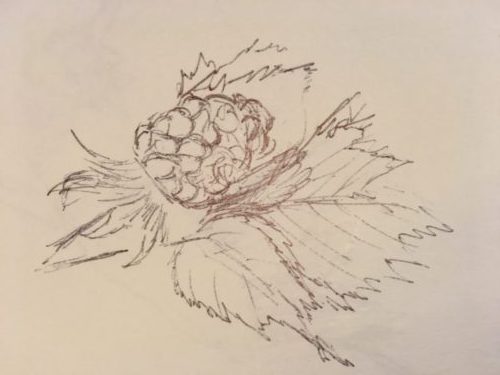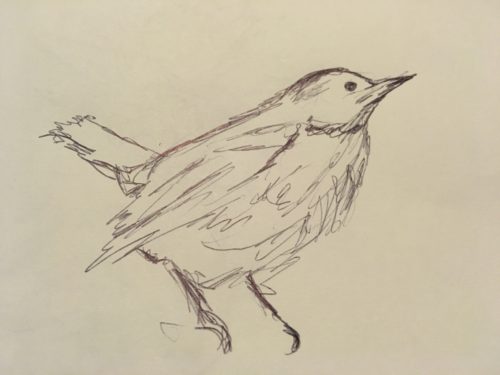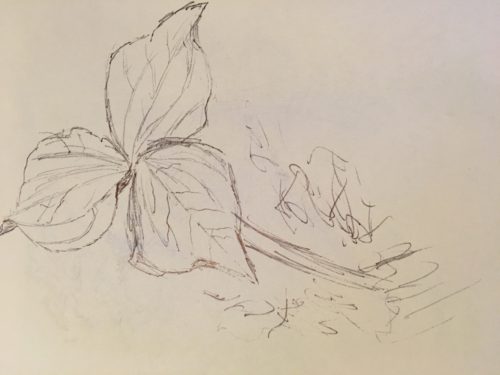
Reflections of Diobsud Creek
Story and art by Alexei Desmarais, graduate student in the Institute’s 16th cohort.
What is natural history? Why do we engage in this practice? And what can it teach us about the world in which we live? And about our relationship with this world?
These questions prompted the line of inquiry that became my natural history project, sending me deep into the verdant forests of the Diobsud Creek drainage, digging through the literature, and searching the inner reaches of my personal landscape for resonance with this marvelous external landscape. A landscape which shapes and grounds my being.
What follows are a number of small excerpts from my project, the full booklet of which can be found in the Wild Ginger library at the North Cascades Institute Environmental Learning Center.
What is trustworthy in our lives?
Soil, Air, Light, Water.
The world is full. Each individual being exudes its own light. Face to face with rock, strewn with countless varieties of lichen and moss—feathery boa-like strands, cups, lettuce-like leaves—I feel diffuse heavenly light round the globe and spill through void and cloud and tree to reflect back into my retina. To spill over into my visual field. I reflect back out into the world…

Wren by Alexei Desmarais
The song of the white-crowned sparrow is not merely repetition. Not the unconscious manifestation of something encoded deep within the bird’s DNA. Not merely its heritage. Each song is unique. Each is a thing of inexplicable beauty—the spontaneous burgeoning forth of a lyrical expression wholly individual. A moment of immanence, in which sparrow, vibrating air, listeners (vibrating eardrums), and earth are wrapped into one common experience. Curled tightly into a song. This song is each time a unique expression of being in the world—a moment of creation inseparable (though also wholly distinct) from the artist’s grasp of stylus, brush, or bow. Each time an enactment of that mysterious event long ago, from which burst forth this miraculous world we inhabit.
running up rivers
familiar sponge of earth
each step a spray
gray-green waters
no water
silt and stone
no river no stream
no trickle no wash no draw
no rill
water does not roar
does not rush nor murmur
nor babble nor cascade
nor tug implacably out toward sea
water
we do we are
tributaries to an old old world
attribute color grace intention
in a clumsy attempt
to call ourselves home
To achieve a deep and personal knowledge we need to move beyond the limits of objectivity. into the realm of receptivity. We must nurture and practice our capacity to respond to the world around us. Our capacity to live responsibly and relationally. We need to re-examine the story of who we are in this world. The story of the world in which we live must include us, but it must also include the stories of countless other beings. We must open ourselves to “the ability that an alien form of sentience has to echo one’s own, to instill a reverberation in oneself that temporarily shatters habitual ways of seeing and feeling, leaving one open to a world all alive, awake and aware.” (Abram, The Spell of the Sensuous, p. 19). “We must understand our lives’ meaning in relationship with the natural world.” We must re-enter into this spiritual exchange if we are to find “our life.” (Cajete, Look to the Mountain, p. 63).

Trillium by Alexei Desmarais
We need more than mere data, data that may—in all its objectivity—cordon us off from participation in the world of which we speak. And which we seek to know. I have little faith in a society that forgets it is nourished by the ground, that does not know—in its heart as well as its mind—the power of place to provide meaning to our lives and to support us as we search for our vocation, for those values that would guide us in our life journey. What we are lacking is a sense of truth that is rooted in place and in the “relations we sustain with the rest of nature. A human community that lives in a mutually beneficial relation with the surrounding earth is a community, we might say, that lives in truth.” (Abram, The Spell of the Sensuous, p. 264).
In seeking to reverse course, to combat the pernicious and persistent problems that plague our earth—from climate change to long-standing systems of oppression and domination—I believe that it is paramount that we do not merely seek to know the world, but that we truly make ourselves available to the place. That, in our interactions with the more-than-I world, we create an environment in which thinking and responsiveness and awe and speculation can take place. An environment that allows the truth to burgeon forth from the manifold modes by which the world manifests. An environment that enables us to develop or “discover a morality that is not an abstraction, one that emerges out of the local ecology, one [we] can adhere to in…place.” (Nabhan, Cultures of Habitat, p. 113).
Natural history calls for a participatory focus, through which we allow ourselves to be drawn into relationship with other beings. We become attuned to mind, to metaphor, to electricity as these exist in the air. And not merely as they exist in our own heads. Natural history calls us to decolonize our minds, to look beyond the narratives that bind and guide us, and to the listen to the voices in the landscape. Especially those that lie silent.
Natural history matters because it invites us to participate in the world. But only if we let go of any sense that we are, by expanding our knowledge of the world, on the track toward saving it. Only if we focus instead on repairing relationship, restoring our lives in place. Natural history can help us re-find way of living in responsive and reciprocal proximity with the world. It can be a practice of re-orienting ourselves to place when, as a society, we have lost our bearings. A practice of seeking solid ground when we have misplaced our feet. Of seeking to once more stand—physically and spiritually—on the earth. Of settling our being on ground that is sound.
We must re-sound.

